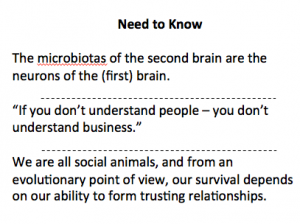Lessons Learned from Street People
November 14, 2015 ~ Written by: W.B. “Bud” Kirchner
 “Follow effective action with quiet reflection. From the quiet reflection will come even more effective action.” ~ Peter Drucker
“Follow effective action with quiet reflection. From the quiet reflection will come even more effective action.” ~ Peter Drucker
As I sit here in a reflective mood that accompanies transition (I am just finishing my Chopin martini and about to start my Borolo wine) I am thinking about what is now roughly 50,000 words (that’s 200 pages in novel form….) I have written under the banner of the Business Brain Model.
Just to be clear I am bragging on quantity not quality!
 Anyway – what I am thinking about is the large spectrum of topics we have covered and challenging myself to come up with a common denominator. The essence of the Business Brain Model if you will.
Anyway – what I am thinking about is the large spectrum of topics we have covered and challenging myself to come up with a common denominator. The essence of the Business Brain Model if you will.
And I believe I have come up with the answer.
What could it be?
Hint: I have quickly eliminated money, technology, manufacturing, sales, decision-making, communication, etc.
Just to make it interesting let me give you a clue.:
“If you only give once a month please think of me next time.”
This is the revised sign message for a street person – as modified by Simon Sinek in his 99U presentation “If You Don’t Understand People, You Don’t Understand Business” – which resulted in about a 7x increase in ‘donations’ to the street person. The point of the story is that when you recognize that your customers, (in case of a street person)clients or staff are all people and relate to them accordingly – then there are more vibrant (lucrative, rewarding) transactions/interactions. As Sinek points out, we are social animals and from an evolutionary point of view our survival depends on our ability for trusting relationships.
So the answer is?
People are the common denominator of the Business Brain Model.
With the answer revealed, just a few more minutes fleshing out the Sinek example.
Here is his rationale in revising the standard “I am homeless” or “I am a dog lover” etc.:
- You need to transmit a legitimate need and credibility (I will still be here next month).
- I empathize with your situation (you can’t give to everyone). Incidentally, the use of the word empathize is mine (not Sinek) since it is a nice segue to the sister article in this quick series.
Sinek would argue he has revised the pitch to be about the giver not the taker because we are most sympathetic when we identify with the other party.
Personal experience
“The one thing I know is that you win with good people.” ~ Don Shula, NFL Hall of Fame coach
This is not a new idea to me – almost ten years ago in a nationally televised PBS interview – I went so far as to draw a parallel with the old adage about real estate being about location, location, location. In my version, I said business is about people, people, people.
What led me to this point of view?
The most relevant part of my career to this topic is Kirchner Group’s restructuring work. In the early years, like many people in this line of work, I was all about systems and processes expertise and a take no prisoner attitude. In short, we would see the human aspect of a struggling business as a distraction.
Over the years, I have done an almost 180o turn. Today, we work as a team with people in the trenches (e.g. shop floor) but we also spend the time to get to know the previous management. As you might imagine this sometimes takes willpower. How many people took the time to be empathetic with the captain of the Titanic as they headed for the lifeboat?
As we think about a go forward plan, we focus on people aspects as much as we do cash flows. This new plan reflects what we have learned about the people aspect of previous decisions and priorities.
I can assure you this holistic approach has served us well. And I fully believe it will serve you well or I wouldn’t be writing this. So what do you believe? Are you in the people business? Are you in business for the people? Consider the comments an informal survey.
Up next, the sister article for this one will focus on the one characteristic that makes people – people: empathy.
And in closing, I can’t put it any more succinctly than Sinek:
“If you don’t understand people – you don’t understand business.”
About the Author: W.B. “Bud” Kirchner is a serial entrepreneur and philanthropist with more than 50 years of business success. He is not a scientist or an academic but he does have a diversified exposure to neuroscience, psychology and related cognitive sciences. Generally speaking, the ideas he expresses here are business-angled expansions of other people’s ideas, so when possible, he will link to the original reference.
